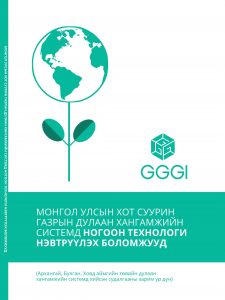At a Glance
| Publication Date | June 2021 |
|---|---|
| Format | |
| Country | Mongolia |
| Thematic Area | Sustainable Energy |

Sustainable energy development has been one of the key priorities in GGGI’s work based on belief that energy powers economic growth and social development. GGGI’s activities focus on energy transition, energy system planning, and scaling-up investment in clean and energy efficient infrastructure in its member countries. GGGI acknowledges multi-benefits of energy efficiency that has significant impact in reducing GHG emissions and improving air quality, health and well-being of the communities.
In Mongolia, GGGI delivers policy advisory and technical assistance in supporting Mongolia’s transition from brown to green and sustainable energy and improving energy efficiency. Within this framework, GGGI pursued series of approaches: i) policy and planning support to Mongolia’s transition to green energy systems (including green financing mechanisms such as PPP and MGFC); ii) technical analysis on alternative energy systems for peri-urban areas of Ulaanbaatar and aimag centers with focus on energy demand side; iii) design and development of energy efficient projects for public education buildings; and iv) development guidelines, methodologies and pipeline projects for planning and designing energy efficiency measures.
Sustainable solutions for low-carbon heating systems in provincial centers is critical for the country’s socio-economic growth. GGGI supported the GOM in undertaking a Situation Analysis of heating systems in Arkhangai, Bulgan and Khovd aimag centers to identify long-term solutions for transforming heating systems and reducing air and environment pollution in rural settlements. The study identified and prioritized the interventions required for improvement of the heating systems to reduce air pollution.
The Situational Analysis examined planning and development for alternative heating systems through i) desktop review of heating systems and methodology for measuring policy targets; ii) situation analysis and capacity assessment of heating systems for selected three aimag centers; iii) guidebook development on heating systems planning tools; iv) capacity building on heating systems planning; v) investment analysis and prioritization for heating systems; and iv) multi-stakeholder communications and outreach.
The study investigated baseline performance and main technical aspects of the local context, including climate conditions and socio-economic characteristics. Alternatives recommended to transform current heating systems in three (3) cities is expected to reduce GHG emissions by 49.9tCO2eq by 2023 and 67.1tCO2eq by 2027 with total investment of US$45.5mln.